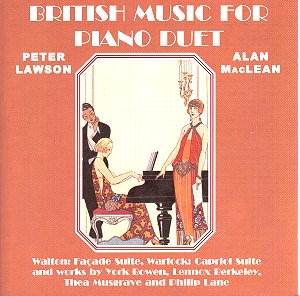A few years ago, these same artists recorded
a similar programme of British music for piano duet by Berners,
Walton, Lambert, Rawsthorne and Lane (Albany TROY142) in which
Walton was represented by his Duets for Children.
This time, Walton is represented by Lambert’s expert arrangement
for piano duet of the two orchestral suites drawn from Façade.
I must admit that I did not know this version, but it is superbly
done and works remarkably well although some may still prefer
Walton’s brilliant orchestration. Anyway, in whatever version,
Façade is a marvellous piece of music and
the present version is not without merits.
Bowen’s Suite Op.52 and Three
Pieces Op.71 (also sometimes known as Suite No.2
and recorded as such by Bruce Posner and Donald Garvelmann on
Olympia OCD 680) are no newcomers to the catalogue. Both pieces
display Bowen’s superb piano writing and are quite attractive.
Dance, the second movement of the Suite Op.52,
recalls Grainger whereas the Barcarolle of the Three
Pieces Op.71 is simply superb.
Capriol Suite is another favourite,
especially in its version for string orchestra. However, it seems
that this version for piano duet may have preceded it, albeit
briefly. Warlock also made a version for full orchestra which
is, I think, too rarely heard although Vernon Handley recorded
it for Chandos several years ago.
Berkeley’s Palm Court Waltz was
originally written for orchestra, but the present version has
often been performed in recitals and available in commercial recordings
(Hyperion … and it was also featured in the British Music Society’s
very first CD entirely devoted to Berkeley’s piano music). It
is a short delightful, mildly ironic parody to be enjoyed for
its own sake, but it is superbly crafted all the same.
The present selection also includes two novelties:
a comparatively early work by Thea Musgrave and a quite early
one by Philip Lane. Musgrave’s Excursions, composed
in 1965 and including an easier part so that the piece may be
played by teacher and pupil, is more straightforward than usual,
i.e. by Musgrave’s standards. The music nevertheless puts considerable
demands on younger players, but is quite simply delightful, full
of humour and vitality. Philip Lane’s Scherzo Burlesco
was composed at about the same time as his delightful Badinages
(on Albany TROY142) as a short pièce d’occasion
described by the composer as "a musical ‘mad dash’ to
be played in a manner reminiscent of swatting away a fly".
This says much for the unbuttoned, playful and extrovert nature
of the music. It should be included as an encore in any piano
duet recital.
Curiously enough, this most enjoyable disc went
unnoticed at the time of its release (2000). I must admit that
I was not aware of its existence. My suggestion is that you rush
to get it, sit down and enjoy this attractive programme superbly
played and well recorded. No big masterpieces, maybe, but immense
musical pleasure from first to last.
Hubert Culot
